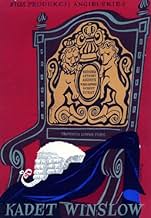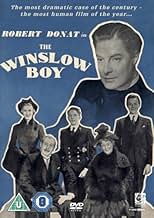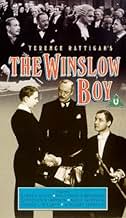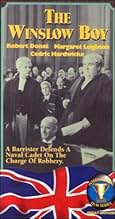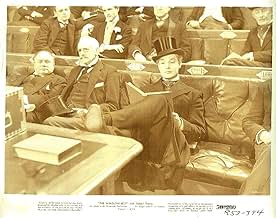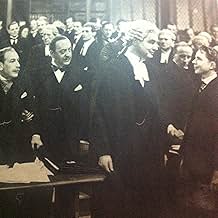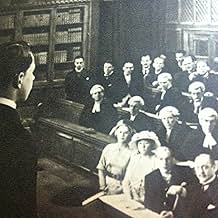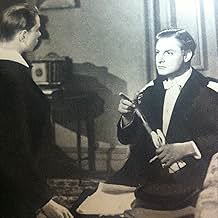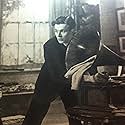VALUTAZIONE IMDb
7,6/10
2004
LA TUA VALUTAZIONE
Aggiungi una trama nella tua linguaIn pre-WWI England, a youngster is expelled from a naval academy over a petty theft, and his parents raise a political furor by demanding a trial.In pre-WWI England, a youngster is expelled from a naval academy over a petty theft, and his parents raise a political furor by demanding a trial.In pre-WWI England, a youngster is expelled from a naval academy over a petty theft, and his parents raise a political furor by demanding a trial.
- Regia
- Sceneggiatura
- Star
- Nominato ai 1 BAFTA Award
- 1 vittoria e 2 candidature totali
Cedric Hardwicke
- Arthur Winslow
- (as Sir Cedric Hardwicke)
Recensioni in evidenza
"The Winslow Boy" has an interesting pedigree. The story is based on a real case involving a young cadet who was dismissed from his school without any sort of trial or due process. It seems in the early part of the twentieth century in Britain, there was a petty theft and the boy was punished even though it was not clear he'd committed the crime. Not surprisingly, the boy's father insisted there was a miscarriage of justice...but what makes it interesting is that the case didn't drop there but made its way all the way up to sessions of Parliament....where the case was championed by an MP. Some time later, the playwright and screenwriter, Terrence Rattigan, resurrected the story and wrote a play about it...and changed the names in the process. Now, some time after the play, the story finally made its way to film and Rattigan teamed up with one of his favorite directors for this well made movie.
It certainly helps the story that two very distinguished English actors appeared in two of the leading roles, Robert Donat and Sir Cedric Hardwicke. Oddly, Donat was given top billing...even though he doesn't appear in the film until about the 40 minute mark! But both are mesmerizingly good...and the well crafted story really makes an impact on the viewer, as they, too, are outraged by the school's high-handed and unfair handling of the case...especially when the accused was a mere boy. Well worth your time.
It certainly helps the story that two very distinguished English actors appeared in two of the leading roles, Robert Donat and Sir Cedric Hardwicke. Oddly, Donat was given top billing...even though he doesn't appear in the film until about the 40 minute mark! But both are mesmerizingly good...and the well crafted story really makes an impact on the viewer, as they, too, are outraged by the school's high-handed and unfair handling of the case...especially when the accused was a mere boy. Well worth your time.
By comparison with today's more pacey films, Anthony Asquith's version of the Terence Rattigan classic might seem somewhat slow, with long shots focused on the protagonists' faces and frequent use of the shot/reverse shot technique. As a piece of character-focused drama, however, the film could not be bettered. Set just before the outbreak of World War I, the film concentrates on the trial of a thirteen-year- old boy (Neil North), wrongly accused of stealing a postal order. His father (Cedric Hardwicke) is determined to fight the case, and engages top prosecuting counsel Sir Robert Morton (Robert Donat) to plead the case. While the film works as a courtroom drama, its main focus is on characterization; those small facial gestures that appear to say so little but actually say a whole lot about the protagonists' preoccupations. The Winslow family are concerned to maintain their English sang-froid, but that becomes very difficult as the case wears on. Hardwicke is quite brilliant at showing how the case affects Mr. Winslow; his tired expression as the film unfolds is rapidly superseded by a small smile as he discovers the result and staggers outside to talk to the press. Initially Donat appears as something of a cold fish, but he admits to Winslow's daughter Kate (Margaret Leighton) by the end that this is a facade constructed purely for public consumption. The ending is quite unexpected for both of them. For lovers of British variety of the mid-twentieth century, the film contains the added bonus of two performances by Cyril Ritchard and Stanley Holloway.
This film kept me in suspense not knowing what the outcome would be. The acting, period atmosphere and historical recreation are all outstanding. The Winslow Boy is directed by Anthony Asquith and has a stellar cast led by Cedric Hardwicke, Robert Donat, Margaret Leighton and others. The film evokes a period of time when honour, self-sacrifice and the heavy arm of authority ruled countries such as England in the name of the common good.
The setting is the Edwardian Era of early 20th century England and into this time and place, we find a youth who has been expelled from a naval academy for stealing. The family believes he is innocent and his recently-retired father, distant from his children, ageing and afflicted with arthritis, sees an opportunity to strike a blow for his youngest child against injustice. In jurisprudence, it is called let right be done.
In this heroic effort, Arthur Winslow the father, played by Cedric Hardwicke, is backed by the strong conviction of his daughter Kate (Margaret Leighton) and Sir Robert Morton who takes on the government of the day (Robert Donat).
Thirteen-year old Ronnie Winslow is expelled from his academy for theft. The evidence against him is real but the son is adamant that he is innocent. Arthur Winslow believes his son and takes the matter to his lawyer and eventually to the Cabinet. He is paid a visit by Robert Donat, as Sir Robert Morton, a Member of Parliament, who takes up the case.
One of the most hard-hitting scenes is a ruthless cross-examination. The boy maintains his innocence and the MP leaves their home convinced of the boy's innocence. The badgering is relentless and had me on the edge of my seat as Donat hurls one accusation after another at the boy, who does not bend during the ordeal.
Sir Robert takes a shine to Kate, Arthur Winslow's daughter, who is played by Margaret Leighton. She superbly performs the role and risks her engagement by pressing the MP to proceed with the case, which has now become a national sensation.
There is a dramatic showdown in the House of Commons and the First Lord of the Admiralty, egged on by Sir Robert, agrees to let the case go to court. The final outcome has added emotion as the senior Winslow, and Sir Robert are tired and ailing.
This is an excellent period piece as well as high drama with great acting by the leading players and those in supporting roles, particularly Kathleen Harrison, the housekeeper. The era is evoked with scenes taking place on golf courses and men's clubs where politicians discuss matters of state, not to mention the churches, concert halls and railway stations. The nation's affairs are dominated by the suffragettes and the Irish question. All-round great entertainment. Highly recommend.
The setting is the Edwardian Era of early 20th century England and into this time and place, we find a youth who has been expelled from a naval academy for stealing. The family believes he is innocent and his recently-retired father, distant from his children, ageing and afflicted with arthritis, sees an opportunity to strike a blow for his youngest child against injustice. In jurisprudence, it is called let right be done.
In this heroic effort, Arthur Winslow the father, played by Cedric Hardwicke, is backed by the strong conviction of his daughter Kate (Margaret Leighton) and Sir Robert Morton who takes on the government of the day (Robert Donat).
Thirteen-year old Ronnie Winslow is expelled from his academy for theft. The evidence against him is real but the son is adamant that he is innocent. Arthur Winslow believes his son and takes the matter to his lawyer and eventually to the Cabinet. He is paid a visit by Robert Donat, as Sir Robert Morton, a Member of Parliament, who takes up the case.
One of the most hard-hitting scenes is a ruthless cross-examination. The boy maintains his innocence and the MP leaves their home convinced of the boy's innocence. The badgering is relentless and had me on the edge of my seat as Donat hurls one accusation after another at the boy, who does not bend during the ordeal.
Sir Robert takes a shine to Kate, Arthur Winslow's daughter, who is played by Margaret Leighton. She superbly performs the role and risks her engagement by pressing the MP to proceed with the case, which has now become a national sensation.
There is a dramatic showdown in the House of Commons and the First Lord of the Admiralty, egged on by Sir Robert, agrees to let the case go to court. The final outcome has added emotion as the senior Winslow, and Sir Robert are tired and ailing.
This is an excellent period piece as well as high drama with great acting by the leading players and those in supporting roles, particularly Kathleen Harrison, the housekeeper. The era is evoked with scenes taking place on golf courses and men's clubs where politicians discuss matters of state, not to mention the churches, concert halls and railway stations. The nation's affairs are dominated by the suffragettes and the Irish question. All-round great entertainment. Highly recommend.
Arthur Winslow is the head of a respectable London family; however this threatens to change when his young son is expelled from military school for stealing a postal order worth 5 shillings. Winslow risks his wealth and his family to pursue justice for his son. However when the military court of appeal rejects him he has to appeal to the highest court in the land through MP Sir Morton.
Having seen a recent version of this play I was curious to see another and was glad when I spotted it coming onto television. The play itself is pretty stagy and because of this it doesn't suffer from being dated the 1948 production values are easily the equal of the 1998 version. The film here differs from the recent version in that it has much more of the legal wrangling onscreen and not off. This makes the film much better as it encompasses both the social battle of the Winslow's and the legal one.
Both are involving and gripping but I must admit that I wasn't as caught up in the social drama as much as I wanted to be, because I felt that any family who's main worry in life was that there son had been excluded from school needn't worry about much! The fact that the Winslow's were able to get the ear of an MP just made it more difficult for me to get into few people live in such high circles (even if they work in a bank!).
The cast are good. Hardwicke is good as Winslow but the real star of the piece is Donat as Sir Morton. He is very stiff but also has layers that he reveals as he goes as well as carrying the weight of the legal thrills. The majority of the cast are good in roles of varying sizes and no-one does a noticeably bad job. Some are slight stereotypes but not to the film's detriment.
Overall this is a very good film and is better than the modern version. It mixes drama with wit and romance to good effect and puts the legal drama and the social drama on the same level rather than letting one suffer to the other. It had the potential to feel slow but the drama keeps it interesting throughout.
Having seen a recent version of this play I was curious to see another and was glad when I spotted it coming onto television. The play itself is pretty stagy and because of this it doesn't suffer from being dated the 1948 production values are easily the equal of the 1998 version. The film here differs from the recent version in that it has much more of the legal wrangling onscreen and not off. This makes the film much better as it encompasses both the social battle of the Winslow's and the legal one.
Both are involving and gripping but I must admit that I wasn't as caught up in the social drama as much as I wanted to be, because I felt that any family who's main worry in life was that there son had been excluded from school needn't worry about much! The fact that the Winslow's were able to get the ear of an MP just made it more difficult for me to get into few people live in such high circles (even if they work in a bank!).
The cast are good. Hardwicke is good as Winslow but the real star of the piece is Donat as Sir Morton. He is very stiff but also has layers that he reveals as he goes as well as carrying the weight of the legal thrills. The majority of the cast are good in roles of varying sizes and no-one does a noticeably bad job. Some are slight stereotypes but not to the film's detriment.
Overall this is a very good film and is better than the modern version. It mixes drama with wit and romance to good effect and puts the legal drama and the social drama on the same level rather than letting one suffer to the other. It had the potential to feel slow but the drama keeps it interesting throughout.
Terence Rattigan, once the toast of London's West End, fell very much out of favor when a new generation of playwrights made his plays seem antiquated and irrelevant. It took David Mamet's excellent filming of the "Winslow Boy" to remind us, that at his best, Rattigan was an exceptionally fine dramatist. Having much enjoyed the movie, I was curious to see the 1948 version directed by Anthony Asquith, who worked on a number of occasions with Rattigan.
It's an exceptional film from all accounts. Asquith's adaptations of theater works for the screen are excellent. Without opening them out too extensively they manage to avoid being stage bound, (Pygmalion, Browning Version, Importance of Being Earnest).
Being already familiar with the storyline, I simply sat back and savored the wonderful performances, and what performances they are. Cedric Hardwicke as the father lacks the softness of Nigel Hawthorne's portrayal and yet that's what precisely makes it ultimately more moving. Robert Donat overflows with charisma and Margaret Leighton plays her very first screen appearance with much intelligence and total aplomb.
The best of British
It's an exceptional film from all accounts. Asquith's adaptations of theater works for the screen are excellent. Without opening them out too extensively they manage to avoid being stage bound, (Pygmalion, Browning Version, Importance of Being Earnest).
Being already familiar with the storyline, I simply sat back and savored the wonderful performances, and what performances they are. Cedric Hardwicke as the father lacks the softness of Nigel Hawthorne's portrayal and yet that's what precisely makes it ultimately more moving. Robert Donat overflows with charisma and Margaret Leighton plays her very first screen appearance with much intelligence and total aplomb.
The best of British
Lo sapevi?
- QuizThis film is based on the real-life Royal Navy cadet George Archer-Shee (1895-1914), the alleged theft took place in 1908 and the trial in 1910. Archer-Shee was commissioned in the British Army in 1913 and was killed in WWI at the First Battle of Ypres on October 31, 1914.
- BlooperWhen the film opens, a suburban train is coming into a station. The locomotive is in the livery of LNER (London & North Eastern Railway). Arthur Winslow alights having told his travelling companions that he has just retired from Lloyds Bank. When he gets home he shows his wife a pocket watch the bank gave him to mark his retirement. It's dated 1912, but the LNER wasn't created until 1923.
- Citazioni
Sir Robert Morton: I wept today because right had been done.
Catherine Winslow: Not justice?
Sir Robert Morton: No, not justice, right. It's easy to do justice, very hard to do right.
- ConnessioniVersion of The Winslow Boy (1958)
I più visti
Accedi per valutare e creare un elenco di titoli salvati per ottenere consigli personalizzati
- How long is The Winslow Boy?Powered by Alexa
Dettagli
- Data di uscita
- Paese di origine
- Lingua
- Celebre anche come
- The Winslow Boy
- Luoghi delle riprese
- London Film Studios, Shepperton, Surrey, Inghilterra, Regno Unito(studio: produced at London Film Studios Shepperton, England)
- Aziende produttrici
- Vedi altri crediti dell’azienda su IMDbPro
- Tempo di esecuzione
- 1h 57min(117 min)
- Colore
- Proporzioni
- 1.37 : 1
Contribuisci a questa pagina
Suggerisci una modifica o aggiungi i contenuti mancanti

